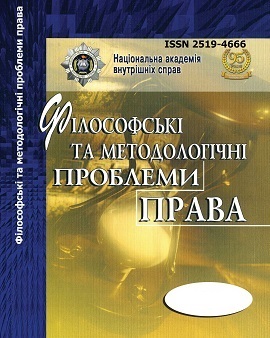The Right to be Human
Abstract
The concept of a human is fundamental to many sciences, including law. It is the basis of all international legal acts, both universal and regional (conventions, declarations, resolutions, etc.). That is why the concept of a «human» (as a biological and social being) must be defined precisely and unambiguously in the theory of law. There is no unified definition of this conception of international law that makes it possible to interpret it arbitrarily at the level of national law. That is why the settlement of internationally unified terminology will help avoid disagreements that exist on the national level to address many human rights issues.
The concept of a «human» is a complex scientific category and therefore cannot be limited to purely legal content. An unambiguous scientific definition of a «human» is a complex interdisciplinary task for legal science, philosophy, philology, biology, medicine, embryology and others. From the correct definition of the concept of a «human» depends an approach of the understanding the essence of many issues that have legal significance (conducting scientific experiments, abortions, active and passive euthanasia, etc.). Unambiguous interpretation of this concept will avoid contradictions regarding the legality of the above-mentioned actions.
The issue of the human right to life should be based not only on the concept of a «human», but also on «life» (its content, limits, possibilities of compulsory or voluntary restrictions, etc.), because of the positive duty of each state is to protect human life. Depriving
a human of his/her right to live (as a result of scientific inexperience) a degrades human dignity, since life is a natural process that cannot depend on the will of the legislators, and the right to life is congenital rather than acquired natural human right.
The binding of the concept of a «human» to the subjective moment of life incipience (depending on the difference in the national law of the countries of the world) and 100 % by the time of birth is a scientifically false concept.
Since there is no moment when a child in the womb (at the prenatal stage of his development) becomes a person. Similarly,
the moment of birth is not the initial phase of transforming the
«non-human» into a person and does not change the biological status of a person. Throughout life, there is also no moment in person-to-person transformation. Similarly, there is no reverse process by which a person/human would cease to be
a person/human (for example, during a vegetative coma).
Uncertainty of the concept who is a «human» deprives a «human» the right to protection during the most critical periods of life. Therefore, it requires fixing not only of the legal status of an embryo (fetus), but of a person in general.
Consequently, the legal unambiguousness of this concept should be based solely on objective scientific data onto a human, which should be the basis of international law, thus avoiding differences in its interpretation. Then the international documents will be truly universal, and the decisions on the international bodies will be binding on all countries that fall under their jurisdiction.
Downloads
Abstract views: 210 PDF Downloads: 396
Copyright (c) 2018 Philosophical and Methodological Problems of Law

This work is licensed under a Creative Commons Attribution-NonCommercial-NoDerivatives 4.0 International License.
- Authors reserve the right to authorship of their own work and transfer to the magazine the right of the first publication of this work under the terms of the Creative Commons Attribution License, which allows other persons to freely distribute published work with mandatory reference to authors of the original work and the first publication of an article in this magazine.
- Authors have the right to enter into separate additional agreements on non-exclusive dissemination of the work in the form in which it was published in the journal (for example, to post an article in the institution's repository or to publish as part of a monograph), provided that the link to the first publication of the work in this journal is maintained.
- The journal's policy allows and encourages the posting of articles by authors on the Internet (for example, in electronic storehouses of institutions or on personal websites), both before the submission of this manuscript to the editorial office and during its editorial processing, as this contributes to the creation of a productive scientific discussion and positively affects the efficiency and dynamics of citing the published work.




